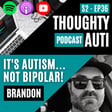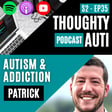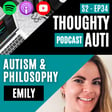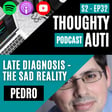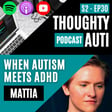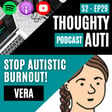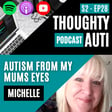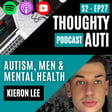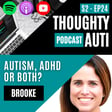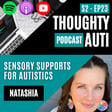
Non-Verbal To Professional Autistic Speaker
How did Paul develop speech after 7 years of being non-verbal? What visual and speech disorders occur in Autistic people? What is it like to have a visual disorder?
Paul Isaacs (@staypuft12) is an autistic public speaker who was late diagnosed with autism and OCD at the age of 24 in 2010. Paul was functionally non-verbal till the age of 11, suffering from a brain injury from cerebral hypoxia before birth. Within this podcast, Paul details his life with visual and speech disorders, and how others can better understand the experience.
My Links - https://linktr.ee/thomashenleyUK // Paul's Blog - https://theisaacs22.wordpress.com/
Dbud Noise Cancelling Adjustable Ear Buds (20% OFF with code: THOUGHTYAUTI) - https://dbud.io/thoughtyautipodcast
Kicking off the episode, Paul explains his history with Autism and OCD. Diagnosed at the late age of 24 he was gifted with a very positive experience, something not common to many.
Paul found a role model in a woman named Donna Williams, who shared many of his experiences in life, recounting her inspiring yet tragic life in great detail.
Starting work at 15 due to his parents increasing concern about Paul's isolation in his room, he had a very ego-centric approach to communication with many processing delays. The two bond over their shared confusion and difficulty identifying bullying, gossiping, and gaslighting within the school system and workplace.
Non-verbal until age 7, Paul describes the numerous visual and speech disorders he was afflicted with due to brain damage inflicted during a placental abruption and consequent cerebral hypoxia. Doctors originally believed he was blind, but eventually identified a few causes of his social, kinaesthetic, and sensory-sampling behaviours.
Paul is hemiplegic, which impacts his visual perception, language, proprioceptive awareness, and some of his motor functionality. His visual agnosia left him unable to register anything he wasn't directly focused on, like extreme tunnel vision... meaning his ability to create word associations to objects in childhood was difficult.
In terms of speech, Paul was 80% meaning deaf. The experience was described as perceiving large amounts of fragmented information, and couldn't interpret language as anything but meaningless phonics. His anomic aphasia made it difficult to find words to say, which resulted in him becoming highly echolalic.
Paul and Thomas describe their shared difficulty with Alexithymia in childhood and how their feelings manifested as physical illness. Paul describes the idea of mergence, something common in infants who are in a state of sensing, rather than interpretation... this mergence was remarked by Thomas as being eerily similar to goals of meditation and the experience of ego-death many chase.
Paul and Thomas do differ in some respects. Thomas describes his default mode network or baseline activity of his brain as being constant and often stressful; Paul doesn't tend to think at all unless baited by OCD






